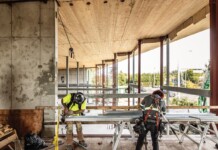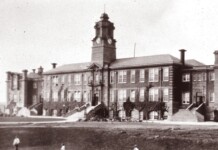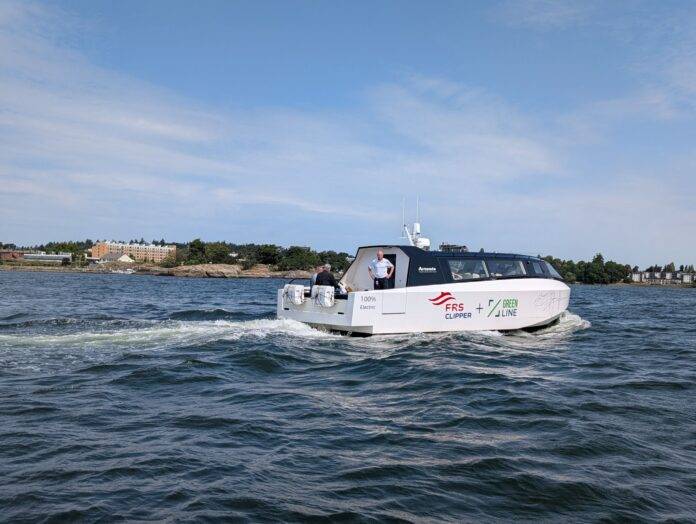IN THE KNOW:
Harbour demonstration introduces the next generation of electric ferries
The future of coastal transportation was on display in Victoria’s Inner Harbour yesterday as Greenline Marine Inc., in partnership with FRS Clipper, hosted a public demonstration of the Artemis EF-12 Escape, an all-electric, hydrofoil passenger ferry that promises to revolutionize marine travel in British Columbia.
Developed by Belfast-based Artemis Technologies, the EF-12 Escape glides above the water on a submerged wing, or hydrofoil, dramatically reducing drag and energy use. The vessel, which seats 12, can reach speeds up to 36 knots—nearly double that of conventional ferries—while using only half the energy.
Its quiet, zero-emission operation and minimal wake are designed to protect marine life and coastal shorelines, positioning it as a sustainable alternative for BC’s busy waterways..
The Victoria demo marks the first stop in a series of technical trials across the province, with upcoming events in Vancouver, Bowen Island, and Gibsons.
The demonstration trips, offered by invitation, are intended to showcase the ferry’s performance, innovative debris detection, and collision avoidance systems—key technologies for safe operation in BC’s complex marine environments.
Greenline Marine, a Victoria-based company dedicated to advancing clean marine transit, sees the capital city as a logical launchpad for this technology. “Victoria’s a great first landing spot,” said Greenline founder and CEO Callum Campbell. “We want to show it off and demonstrate with key stakeholders.”
While the company’s initial focus is on routes connecting downtown Vancouver with Bowen Island and Gibsons, Campbell noted there is long-term potential for similar service in Greater Victoria and other coastal communities.
FRS Clipper, known for its Victoria-Seattle ferry service, is co-hosting the demonstrations and exploring options to deploy larger versions of the Artemis ferry, like the 150-passenger EF-24 Passenger, on B.C. routes by 2027. “There is tremendous opportunity to introduce reliable, high-frequency passenger ferry service to B.C. coastal communities thanks to cost-effective technology like this,” said CEO Mark Collins.
Victoria’s Community Safety Plan addresses calls for urgent action
The City of Victoria has released its Community Safety and Wellbeing Plan, aimed at tackling rising concerns over crime, social disorder, and public confidence in the downtown core.
The 79-page roadmap, two years in the making and shaped by input from over 2,000 residents and stakeholders, features 95 recommendations spanning housing, health care, policing, service delivery, and downtown revitalization.
Mayor Marianne Alto described the plan as a “system change” for the city, pledging to review all municipal policies through a community safety lens. “It is a plan that will, if endorsed and executed well, quite dramatically and in a very sustained and comprehensive way reorient the services the city provides within the context of community safety and wellbeing,” Alto said at a press conference.
Key actions include:
- Increased police foot and bike patrols downtown
- More funding for cleaning, street beautification, and public amenities
- Expanded support teams to assist vulnerable populations late at night
- New shelter and tiny home spaces for those experiencing homelessness
- Calls for provincial and federal action on mental health crisis response and diversion from the criminal justice system
The plan was developed with oversight from a panel of community leaders, including police, social service, and mental health representatives, and is set for council review this week.
The release comes at a critical time for downtown businesses. The Downtown Victoria Business Association (DVBA) recently reported a sharp rise in businesses giving the area a failing grade for safety, with nearly half of surveyed businesses considering leaving downtown if conditions don’t improve. Only 59% of residents now say they feel safe downtown during the day, a steep drop from 83% in 2020.
DVBA CEO Jeff Bray called for immediate, bold action: “They cannot afford to wait any longer for studies, task forces, reports. If they do not see bold action this year, they may decide to move,” Bray said, warning of a potential “wave of closures, job losses, and a dramatic erosion of downtown’s vitality” if safety isn’t improved.
When asked how to spend hypothetical new funding, most businesses prioritized investments in safety—such as more police officers and bylaw patrols—over other needs like parking.
Reciprocity Trust invites land action
The Reciprocity Trusts society says it has helped over 300 homes, small businesses and events provide more than $165,000 in voluntary payments tied to the value of land since its inception in 2023.
Led by Indigenous trustees from ten South Island First Nations, the Trust supports ten beneficiary First Nations: T’Sou-ke, Esquimalt, Songhees, Tsartlip, Tsawout, Tseycum, Malahat, Pauquachin, Scia’new, and Pacheedaht.
Private property is a major ongoing impact on Indigenous rights, especially in urban areas. Reciprocity Trusts encourages residents and small businesses to recognize their place on Indigenous lands and take responsibility for building their own relationships with home Nations.
SMOȻEŦET, Chief Abraham Pelkey, of the SȾÁUTW̱ (Tsawout) Nation expressed, “This is not just a monetary contribution; it’s a meaningful investment in mending the relationships between our communities.”
In March of 2025 the South Island Indigenous Reciprocity Trust made its second distribution of funds to the ten First Nations whose lands now host the residents of the CRD. Guided by the Coast Salish principle of Naut’sa Mawt—working together with one heart and one mind—the Indigenous Trustees chose to share the funds equally among each of the ten First Nations. Each community is using the funds for Nation-identified priorities that support land, language, culture, and Nation-rebuilding.
Lək̓wəŋən (Songhees) Nation is using the funds to support youth – elder mentorship programs operating out of their new youth centre, with the goal of supporting youth entering or reentering the workforce.
Xʷsepsəm (Esquimalt) Nation used funds to support their internal governance capacity building.
SȾÁUTW̱ (Tsawout) Nation is putting the funds towards operating costs of their bighouse, the heart of their community’s culture and wellbeing.
MÁLEXEŁ (Malahat) Nation was able to complete the installation of a multi-sport mini pitch.
Paaʔčiidʔatx̣ (Pacheedaht) Nation put their funds towards hosting a community feast to bring their membership together to share and practice culture.
“If I call an Indigenous territory home, I want to contribute to those Indigenous Nations who take care of it. I don’t have to rely on the government, it’s something I can choose today because I’m just trying to deal with my backyard,” noted Craig Candler, Founder of Reciprocity Trusts in a media release.
Victoria entrepreneurs launch fund to support local events
Andrew Wilkinson, founder of MetaLab and co-founder of investment firm Tiny, has teamed up with business partner Josh Franklin to launch The Culture Fund—a new micro-loan initiative designed to breathe life back into Victoria’s arts and events scene.
Announced Monday, the fund offers loans between $1,000 and $25,000 to event organizers, aiming to make it easier to stage music shows, comedy nights, drag performances, block parties, and other community gatherings.
The Culture Fund is intentionally streamlined: applicants don’t need to submit lengthy grant proposals or have industry connections. Instead, they need a clear vision and the ability to execute. Loans are repaid four weeks after the event at a fixed rate of prime plus three percent, with no collateral required. The goal is to create a revolving pool of funding that can continually support grassroots cultural events across the city.
Wilkinson and Franklin designed the fund to address a critical gap for independent organizers, many of whom struggle to cover upfront costs such as venue deposits or booking fees without taking on personal financial risk. “This isn’t charity. We’re trying to stimulate a sustainable arts, culture, and music scene,” Wilkinson emphasized, noting the need for discipline and sustainability in the fund’s approach.
Josh Franklin, a longtime collaborator with Wilkinson, brings experience in business operations and local investment, further strengthening the fund’s commitment to community-driven growth.
The launch comes as many in Victoria’s cultural sector warn of rising costs, reduced sponsorship, and economic uncertainty threatening the viability of local events. The Culture Fund says on its website that it aims to help restore the city’s pre-pandemic vibrancy by empowering organizers who “create belonging, not just attendance.”
FROM THE PAGES OF DOUGLAS:
That uptick in text messages on your phone urging you to check out the newest summer fashions, return to your favourite restaurant or even commit to a comfy sofa? They’re on the increase, and they’re money makers for Canadian businesses.
MARK YOUR CALENDAR:
JUNE
June 25: Think Local First Summer Mixer
JULY
July 16: Westshore Chamber Summer Social
AUGUST
August 21: Victoria Chamber Mixer
August 24 – 26: Victoria Forum
OCTOBER
October 28 – 30: VIEA ‘State of the Island’ Economic Summit



























